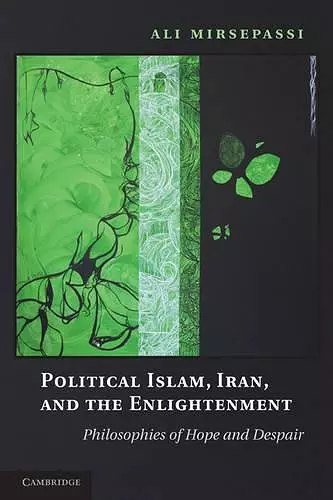Political Islam, Iran, and the Enlightenment
Philosophies of Hope and Despair
Format:Paperback
Publisher:Cambridge University Press
Published:6th Dec '10
Currently unavailable, and unfortunately no date known when it will be back
This paperback is available in another edition too:
- Hardback£90.00(9780521768825)

This book argues that the discourse of political Islam has strong connections to important, disturbing currents in Western philosophy and intellectual trends.
This book presents a powerful challenge to the dominant media and scholarly construction of radical Islamist politics as a purely Islamic phenomenon derived from insular, traditional and monolithic religious 'foundations'. It argues that the discourse of political Islam has strong connections to important and disturbing currents in Western philosophy and intellectual trends.Ali Mirsepassi's book presents a powerful challenge to the dominant media and scholarly construction of radical Islamist politics, and their anti-Western ideology, as a purely Islamic phenomenon derived from insular, traditional and monolithic religious 'foundations'. It argues that the discourse of political Islam has strong connections to important and disturbing currents in Western philosophy and modern Western intellectual trends. The work demonstrates this by establishing links between important contemporary Iranian intellectuals and the central influence of Martin Heidegger's philosophy. We are also introduced to new democratic narratives of modernity linked to diverse intellectual trends in the West and in non-Western societies, notably in India, where the ideas of John Dewey have influenced important democratic social movements. As the first book to make such connections, it promises to be an important contribution to the field and will do much to overturn some pervasive assumptions about the dichotomy between East and West.
"'This text is an extremely valuable and timely contribution to the debate. Mirsepassi's study shows clearly how the critique of the 'West' appropriated by a series of Islamist writers and thinkers, is itself a product of the Western discourse and by extension an integral part of the Western intellectual tradition. In this sense the philosophers of political Islam are no more 'authentic' in relation to Western discourse than the nationalists they rejected." - Ali M Ansari, Professor of Iranian History, University of St Andrews
“This very rich and complex book shows the cosmopolitanism of world cultures in action. Even after the defeat of the Nazis in 1945, the ideological moves behind Nazism were just coming into their own. Mirsepassi illustrates how the world-picture that calls itself Islamism is actually derived from the Western Counter-Enlightenment. This tradition goes back to the midst of the Enlightenment. It showed immense vitality in the 20th century: it reached a climax after WWI, when Martin Heidegger transformed his early Existentialist insight into Nazi propaganda, and another after WWII when his followers produced an explosive alloy of "Nativist" tradition and radicalism for Iran's Islamic revolution. Mirsepassi shows us how this mix poisoned Iranian life for a generation, but also how Iranian intellectuals may have overcome it at last.” - Marshall Berman, Distinguished Professor of Political Science, The City College of New York
"Ali Mirsepassi has established a reputation as a unique and bold scholar. He brings to Islamic studies a theoretical depth and scope rare among scholars. In Political Islam, Iran, and the Enlightenment, he stakes out an original perspective that highlights the Enlightenment influences on contemporary Islamic thinking and politics. In particular, Mirsepassi provides a skillful analysis of Western cultural traditions and their impact on 20thc Iranian intellectuals. This volume will be of great interest to specialists of Islam and to political theorists." - Steven Seidman, Department of Sociology, State University of New York
- Winner of A Choice Outstanding Academic Title 2011
ISBN: 9780521745901
Dimensions: 229mm x 152mm x 14mm
Weight: 330g
240 pages